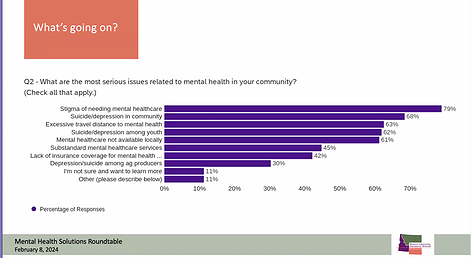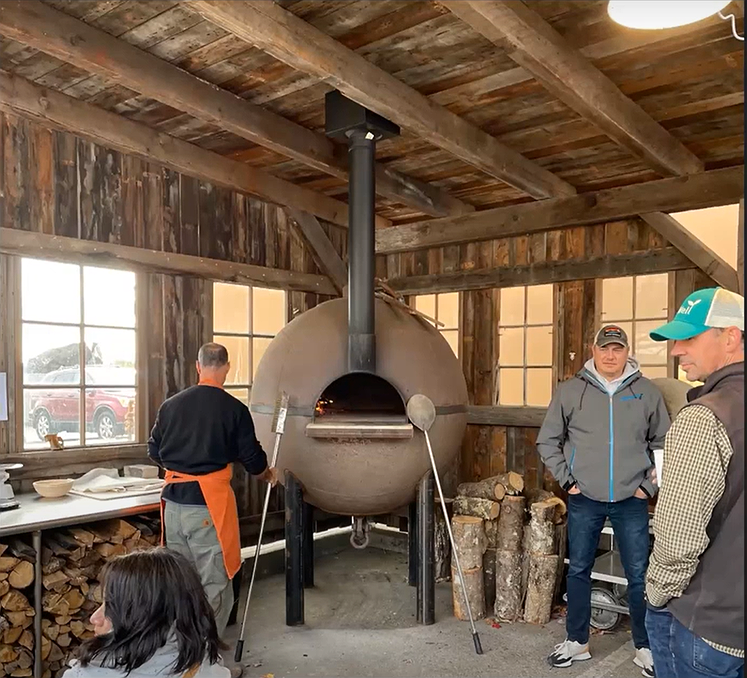'Small but mighty' teams tackle mental health
CAROLYN BOSTICK | Hagadone News Network | UPDATED 1 year, 10 months AGO
Carolyn Bostick has worked for the Coeur d’Alene Press since June 2023. She covers Shoshone County and Coeur d'Alene. Carolyn previously worked in Utica, New York at the Observer-Dispatch for almost seven years before briefly working at The Inquirer and Mirror in Nantucket, Massachusetts. Since she moved to the Pacific Northwest from upstate New York in 2021, she's performed with the Spokane Shakespeare Society for three summers. | February 16, 2024 1:06 AM
Lorie Higgins considers her team at Western Community Assessment Network to be a “small but mighty team” that is a force capable of positive community impact. The same could be said for many of the participants logging on from 35 states to participate in the WeCAN Rural Mental Health Solutions Roundtable.
WeCAN was funded by the U.S. Department of Agriculture six years ago to cultivate collaborations among rural communities in Idaho, Montana, and Wyoming and target issues negatively impacting their communities.
As part of the virtual roundtable, Paige Olsen presented materials on Silver Valley CARES to community members of all backgrounds about how the organization is tackling mental health issues in Shoshone County.
With a ratio of 850 community members to a single mental health provider in Shoshone County, according to the Population Health Institute at the University of Wisconsin, there aren’t enough counselors available, which is where mental health trainings and related education sessions through SV CARES have come into play.
“We wanted to bring anything and anyone that could come in together to help you destress or different ways of what helps your mental health. We don’t want people to think that you have to sit and talk to a counselor. There are other ways to decompress whether through art or fitness or a church,” Olsen said during her presentation.
During both the initial conversation and an informal discussion held after the roundtable, the free community training and outreach by SV Cares sparked interest.
Olsen said securing financial stipends for community members to run SV CARES through outside funding - as a means to keep organizers committed — was an idea people latched onto.
“I definitely think and hope that people do replicate what we are doing. AmeriCorps does have other public health initiatives in other states, so I do hope that people will look into that partnership, as it's been invaluable to our success here,” Olsen said.
One thing she is considering bringing back to Shoshone County as a potential future project is a buddy bench for schools or out in the community.
The aim of a buddy bench is to create a channel to encourage nonverbal connection among peers when a student or individual is feeling isolated or alone.
Similarly, University of Idaho extension educator David Callister shared some of his experiences battling generational pressures of losing the family farm.
“If somebody’s got a broken arm, nobody thinks twice about getting help,” David Callister said. The same, he continued, should also apply for people experiencing chemical imbalance causing harm to their mental health.
Melissa Cook, of University of Wyoming extension jumped on the relationship between economics and state of mind.
“You can’t talk about economic development if you don’t have good mental health,” Cook said.
One of the recurring themes was how sharing a meal can cut through isolation and overcome the social stigma of broaching the topic.
A pizza oven crafted from converted WWII anti-submarine net buoy served as a source of solace as farmers gathered at the Washington State University Bread Lab in Skagit County in 2022.
Josh Tieken spoke candidly about potentially recreating the unlikely project and making it mobile in the farming communities around Rigby, Idaho, after a parent took his own life.
Teiken has a lot of hope for the project drawing members of the farming community out of their isolation.
“By creating something unique, people will want to come over and smell this pizza cooking and make social connections to help break down the stigma of talking about mental health," Teiken said. "Our goal is to make this a mobile pizza oven to help and promote healing in our community. Our hope is that we can be a support in breaking down the stigma without it being shameful."
More information
Northern Idaho Crisis Center — Coeur d’Alene
https://www.nicrisiscenter.org/
Northern Idaho Crisis Center
2195 Ironwood Court, Suite D, Coeur d’Alene — 208-625-4884
Idaho Suicide Prevention Hotline (call or text) — 208-398-4357
National Suicide Prevention Lifeline — 800-273-8255
 Screenshot of WeCAN Rural Mental Health Solutions responses to a survey. Among the community mental health needs reported as serious, 79 percent of the WeCAN roundtable respondents indicated that the stigma of mental care was a major issue, 68 percent indicated that suicidal ideation and depression caused issues and 63 percent noted that travel for mental health care was a top priority.
Screenshot of WeCAN Rural Mental Health Solutions responses to a survey. Among the community mental health needs reported as serious, 79 percent of the WeCAN roundtable respondents indicated that the stigma of mental care was a major issue, 68 percent indicated that suicidal ideation and depression caused issues and 63 percent noted that travel for mental health care was a top priority.ARTICLES BY CAROLYN BOSTICK

Remembering Kent Butler
Fernan Village man died when tree fell on home during windstorm
In the wake of his death during the height of the windstorm Wednesday, Kent's partner and friends of Kent Butler remember him through kindness he shared and the music he made.

Bayview residents seek dock resolution
Lease termination triggers Jan. 1
Bayview residents got an early start on making their voices heard ahead of the termination of the Bayview docks lease scheduled to go into effect Jan. 1 during a Waterways Advisory Committee meeting Thursday. “The county commissioners get meeting minutes and a monthly meeting that’s usually attended by four to five people is suddenly full,” Committee Chairman Doug Harris said.

Falling tree kills man, knocks out power to 80K
At height of storm more than 80,000 were without power
The Wednesday morning windstorm that caused mass power outages for more than 80,000 households across North Idaho and Eastern Washington also led to the death of a Fernan Village man at a residence on Theis Drive.



